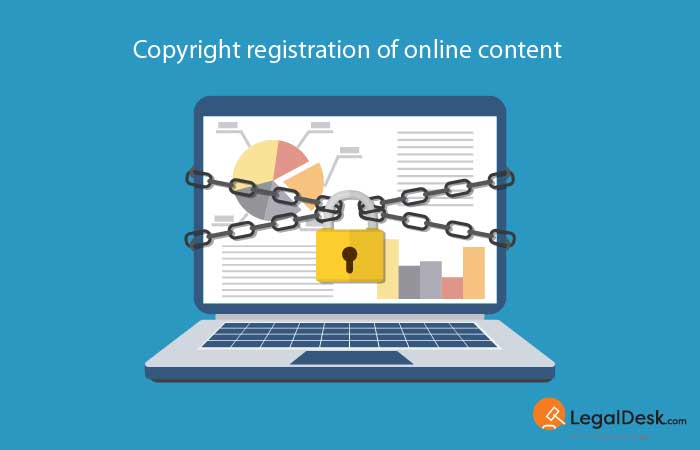With the advent of digital communication, images, text, videos and creative works are easy to steal with the few clicks of a button. Illegally downloading or reusing such works amounts to piracy which is a criminal offense punishable by the Law. There are several things an owner of content can do to protect their online content legally. A Copyright isn’t compulsorily registrable, however, it is recommended.
Copyright
The Copyright Law is governed by the Copyright Act, 1957 and the Copyright Rules. To electronically file for Copyright registration, a registration fee must be paid online to the Copyright Office. Copyright registration is voluntary because any content created is automatically copyright protected in India. Websites contain several proprietary content, designs, artistic or literary elements. A copyright registration needs to be done for each of these elements individually. Thus, one can obtain a copyright for a specific piece of content but not for an entire website or blog.
Any creator of work (literary, films and broadcast, art, sound recordings, etc) are endowed economic rights, that enable the creators to have total control over the use and reuse of their content. A Copyright does not protect ideas, names or titles. The purpose of having a copyright is so that the creator can claim economic rewards for their effort, labour and skill put into the work. All economic rights are conferred to the first author under the copyright law, unless an agreement has been executed between the first author and another party stating a transfer of rights. If any work is created during the due course of full-time employment, then the employer will be the owner of any conferred rights.
A copyright can be bought, sold, transferred or inherited (wholly or in part) much like physical property. Moral rights remain with the author and can be transferred upon death. Any material produced by a department of the Government, the copyright belongs to the Government of India.
It is also important to consider a Permissions Policy, Terms of use, Privacy Policy and disclaimer for your website. These policies/agreements help protect online content legally, ensure the terms of use of such content and also informs a viewer not to infringe on copyrighted content.
Rights of Copyright Holders
The owners of copyrights have the authority to prohibit or authorize (in relation to their work) any of the following acts, in whole or in part:
- Any copies of the work being issued to the public (photocopying, retyping, reproducing, scanning, taping recorded/live music, etc.)
- Public presentation and delivery of speeches or lectures.
- Broadcasting audio or visual works, making an adaptation of literary or dramatic work (even translation) and transcribing a musical work.
- Conversion of computer programme/programmes into a different computer code or language.
- Minor use of material (with references/citations) is permitted as long as it falls within the scope of copyright law.
- Just purchasing/owning a copy or the original of a copyright does not entitle an individual to use the work as per their wishes (e.g. buying a CD, book, etc does not entitle a person to screen the same to the public or make copies of the work). In order to use or reuse someone else’s work, permission is required (sometimes in exchange for royalties).
Steps On How To Protect Online Content
- Place a copyright notice on all your content to deter anyone from stealing your content. This requires just three parts of information attached to your work, namely: the word or symbol ‘copyright’, the date the work was created and the title of the author.
- Technical barriers such as tools to help deter stealing can be employed on images, videos and text on a website.
- Monitoring Online content will enable an individual to check for unauthorized use of copyrighted content. Copyscape is a website tool that checks the internet for pages for content similar to yours or already existing content available online.
- A takedown notice is issued to any infringement or violation of copyrighted content. This informs the violator that they have to take down the content or legal action will be taken.
How Can We Help?
Apart from these services, a website may also require a refund policy, affiliate agreement, anti-spam policy, health disclaimers, compensation disclosure policy, take-down notice, Digital Millennium Copyright Act Notice (DMCA), earnings disclaimer, external links policy, etc. which can be done by LegalDesk.com.


